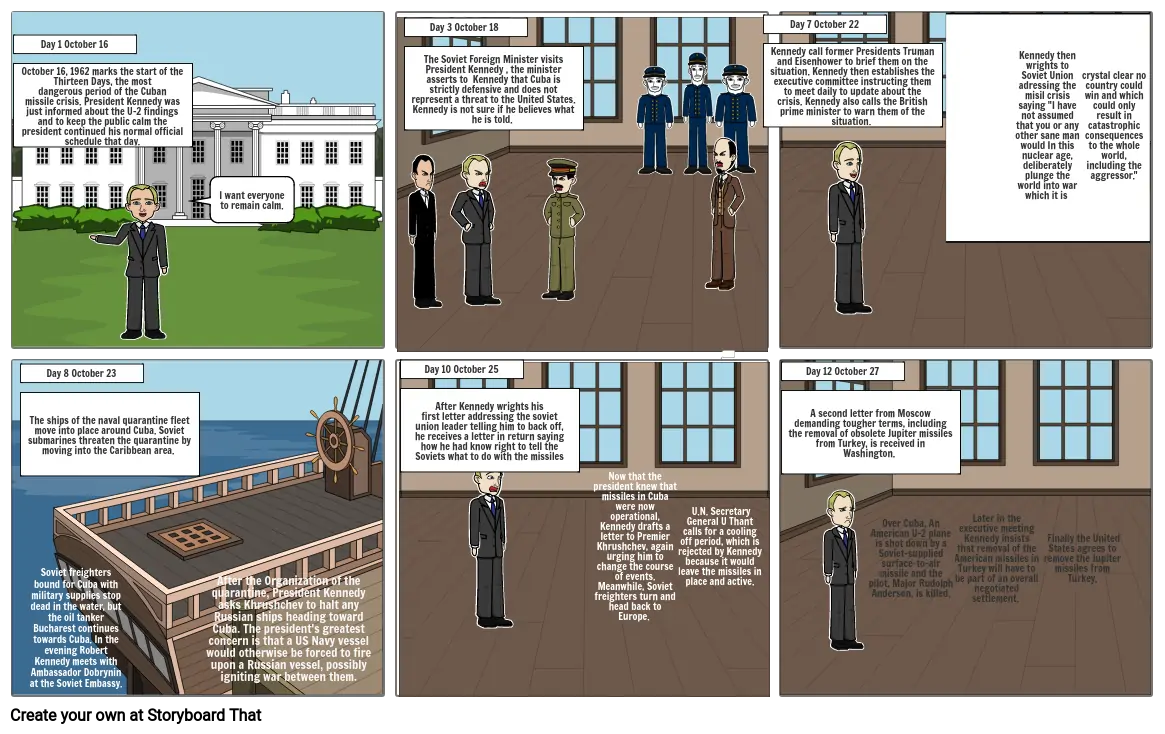The thirteen Days

Siužetinės Linijos Tekstas
- Day 1 October 16 October 16, 1962 marks the start of the Thirteen Days, the most dangerous period of the Cuban missile crisis. President Kennedy was just informed about the U-2 findings and to keep the public calm the president continued his normal official schedule that day.
- I want everyone to remain calm.
- Day 3 October 18 The Soviet Foreign Minister visits President Kennedy , the minister asserts to Kennedy that Cuba is strictly defensive and does not represent a threat to the United States. Kennedy is not sure if he believes what he is told.
- Day 7 October 22 Kennedy call former Presidents Truman and Eisenhower to brief them on the situation. Kennedy then establishes the executive committee instructing them to meet daily to update about the crisis. Kennedy also calls the British prime minister to warn them of the situation.
- Kennedy then wrights to Soviet Union adressing the misil crisis saying "I have not assumed that you or any other sane man would In this nuclear age, deliberately plunge the world into war which it is crystal clear no country could win and which could only result in catastrophic consequences to the whole world, including the aggressor."
- Day 8 October 23 The ships of the naval quarantine fleet move into place around Cuba. Soviet submarines threaten the quarantine by moving into the Caribbean area.
- Soviet freighters bound for Cuba with military supplies stop dead in the water, but the oil tanker Bucharest continues towards Cuba. In the evening Robert Kennedy meets with Ambassador Dobrynin at the Soviet Embassy.
- After the Organization of the quarantine, President Kennedy asks Khrushchev to halt any Russian ships heading toward Cuba. The president's greatest concern is that a US Navy vessel would otherwise be forced to fire upon a Russian vessel, possibly igniting war between them.
- Day 10 October 25 After Kennedy wrights his first letter addressing the soviet union leader telling him to back off, he receives a letter in return saying how he had know right to tell the Soviets what to do with the missiles
- Now that the president knew that missiles in Cuba were now operational, Kennedy drafts a letter to Premier Khrushchev, again urging him to change the course of events. Meanwhile, Soviet freighters turn and head back to Europe. U.N. Secretary General U Thant calls for a cooling off period, which is rejected by Kennedy because it would leave the missiles in place and active.
- Day 12 October 27 A second letter from Moscow demanding tougher terms, including the removal of obsolete Jupiter missiles from Turkey, is received in Washington.
- Over Cuba, An American U-2 plane is shot down by a Soviet-supplied surface-to-air missile and the pilot, Major Rudolph Anderson, is killed. Later in the executive meeting Kennedy insists that removal of the American missiles in Turkey will have to be part of an overall negotiated settlement. Finally the United States agrees to remove the Jupiter missiles from Turkey.
Sukurta daugiau nei 30 milijonų siužetinių lentelių
Nereikia Atsisiuntimų, Nereikia Kredito Kortelės ir Nereikia Prisijungti!
